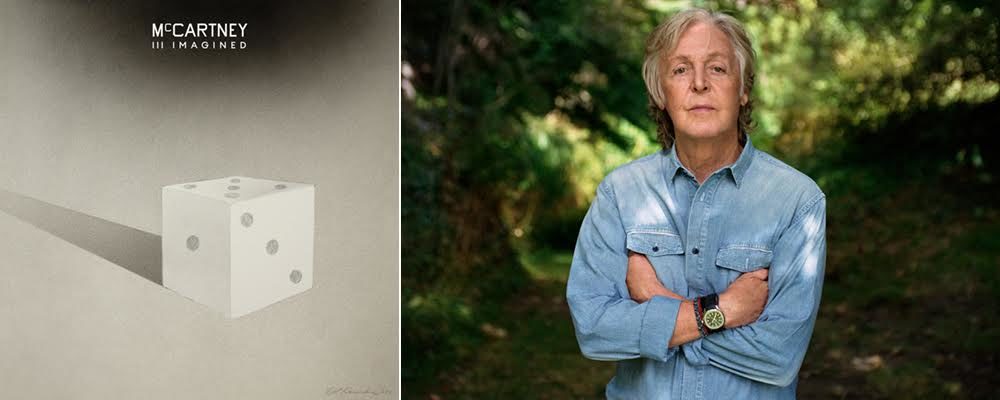Paul McCartney Curates an Eclectic Cast For a Reimagining of ‘McCartney III’
Todd Gilchrist
It’s easy to think of Paul McCartney as a songwriter and artist who influenced literal generations of other musicians; after all, he’s a literal standard-bearer for the foundations of modern pop music. But on “McCartney III Imagined,” fans of his terrific album from earlier this year not only get to listen firsthand to the parallel lines that run through his work and that of his successors, but can actually hear the ways that they may have subtly inspired him as they rose to take his place. McCartney reportedly handpicked this collection of eleven collaborators (12 on physical releases, including a remix by Idris Elba) to offer their interpretations and reworkings of “McCartney III,” and the results are so fun that it wouldn’t come as a surprise if they helped him reclaim some real estate on the pop charts.
Neither full remixes nor covers, the resequenced tracks spotlight McCartney’s songwriting chops while creating new contexts for it, starting with Beck on “Find My Way.” This was a showstopper on the original album, but pairing his voice with Beck’s for a thick slab of white-boy funk only highlights the ways that McCartney’s two vocal ranges — a wispy alto and wobbly tenor — possibly paved the way for Hansen’s as much or more than, say, Prince or any number of acts to which he’s been compared. Musically, the song mirrors what has become Beck’s style since his “Guero” days, groovy rock with an electronic edge, but it feels like a harmonious balance between the two artists that sets the stage for the rest of the record.
Dominic Fike expands the instrumentation on “Kiss Of Venus” for a slinky, soulful redux of McCartney’s catchy acoustic ditty, and then Khruangbin submerges “Pretty Boys” into a psychedelic haze, leaving McCartney’s vocal intact but layering it in reverb and echo. Meanwhile, St. Vincent builds out “Women and Wives” into a jangly showstopper, using McCartney’s vocal as the centerpiece while Annie assembles a choir behind him over her typically eclectic, precise instrumentation and cavernous drums. Each of these new arrangements simply reiterates the durability of McCartney’s talent; even when they emphasize the remixer or fill space with sounds McCartney wouldn’t have used, they still sound like his work, and suggest that he could easily keep churning out work as a songwriting for younger artists without sounding dated at all — much less like a guy who started his career more than 60 years ago.
Blood Orange offers a predictably understated rendition of “Deep Down,” straddling rock and soul with keyboards and pianos that give the song a haunting, funky quality, juxtaposing McCartney’s falsetto fills and guitars played in reverse. Phoebe Bridgers’ lilting cover of “Seize The Day” is just terrific, converting the original version’s tempo changes into a slightly more conventional verse-chorus-verse structure and then layering in female harmonies, one on top of another, to wonderfully meditative effect. Radiohead’s Ed O’Brien builds a wall of reverb around McCartney for his remix of “Slidin’,” a raucous detour into rock and roll, man, among the rest of the record’s more experimental or less conventional reimaginings; as if further emphasizing O’Brien’s discordant contribution, Damon Albarn reworks “Long Tailed Winter Bird” into a funky, ambient workout, complete with what sounds like field recordings wafting in and out of the background, over percolating keyboards that back off only long enough for the strings of McCartney’s original to sporadically erupt in the mix.
“Lavatory Lil” was one of the lesser songs on the original record, but here, Queens of the Stone Age’s Josh Homme gives it exactly the kind of sleaze that it needs, using his supple voice as a counterpoint to electric guitar, creating a low key companion piece to QOTSA’s hit “No One Knows,” minus that song’s propulsive drumbeat (courtesy Dave Grohl). But Anderson .Paak, quickly proving himself to be one of the industry’s most versatile and creative artists, delivers a delightful surprise with his rendition of “When Winter Comes,” starting with a staccato drumbeat and pairing it with watery keyboards that sound like a vintage Bob James instrumental; what’s so fascinating is the way he preserves the tone of the original song, small and intimate, but changes the sound altogether. This certainly isn’t part of the current strain of r&b, even .Paak’s eclectic version of it, but the song fits perfectly both as McCartney’s out-of-time sound and something that it wouldn’t take much imagination to hear next to contemporary singers on the airwaves.
If featuring a member of Gorillaz just a few tracks after Damon Albarn feels like cheating slightly on the record’s one-and-done collection of renditions and remixes, Robert Del Naja, also of Massive Attack, mounts and impressive and ambitious new version of “Deep Deep Feeling” to close the digital release, building momentum steadily over more than eleven minutes to transform what was a centerpiece on “McCartney III” into a transcendent climax, ebbing occasionally into silence and swerving back to life thanks to keyboards that focus your attention on his lyrics while also creating the atmosphere of a fight scene in a “John Wick” movie. But ultimately, it’s precisely that universal-adapter quality of McCartney’s songwriting, and his talent in general, that makes this not just a great creative endeavor, but a possible equal to the original album. “McCartney III Imagined” could easily play like a cynical concession to the forces of modern commercial radio, but even if McCartney didn’t have too much control of his career to avoid that sort of thing, his work oozes with a youthfulness that makes every one of these songs relevant, and these new versions don’t unearth those qualities but spotlight what’s already there.
“McCartney III Imagined” releases April 16 on Apple Music.

